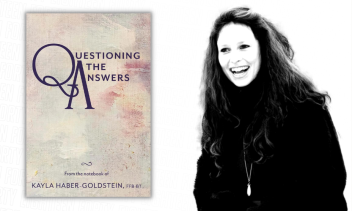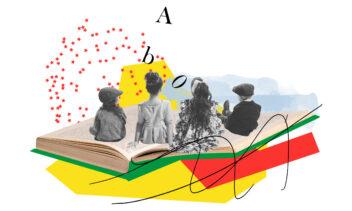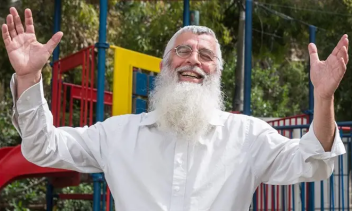Over my life, after countless divrei Torah loved and less-loved, I’ve come to three questions that I often find myself asking after hearing an idea of Torah. These are most helpful for me after listening to a longer-form sermon or shiur, but they apply to most circumstances.
These questions have emerged bottom-up from my life, and I offer them as such—not as prescriptions for how to engage in your own search for wisdom, but as descriptions for how I have engaged in my own, and how I have discovered meaningful engagement in the ideas of Torah.
These were not easy for me to find; they were learned by misdirection, redirection, and constant mistakes. I learned each from a teacher (although sometimes in reaction to the opposite teaching of a teacher). Like Campbell wrote, “If you can see your path laid out in front of you, step by step, you know it’s not your path. Your own path you make with every step you take.” Or makes you? If this is vague, consider William Carlos Williams: “Dissonance / (if you are interested) / leads to discovery.”
These were not easy for me to find; they were learned by misdirection, redirection, and constant mistakes.
Not every Jewish educational institution that I was in supported such questions, and in fact, many did not invite questions such as these. Nonetheless, I believe that my engagement in a life of learning as an independent participant in the process of Torah study is the ultimate fulfillment of those institutions.
Here goes. I hope you enjoy.
1. Does this make sense to me?
This might be the most obvious of questions, and yet it took me countless misunderstood Torahs to realize that the issue was not always me. Some of my favorite ideas of Torah quite simply haven’t made sense at all—and that’s fine! The real dilemma comes to the student (as all listeners are) who struggles to make sense of a thought predicated on a misremembering of a verse, or on a misunderstanding of a passage of Torah or Talmud, or best of all, with faulty reasoning, in which the pieces don’t quite add up.
I’ve struggled mighty hard in my past to wrap my mind around countless “shver questions” or “klutz kashyas” and have had a much greater appreciation for these ideas once I realized that they’re allowed to not quite make sense.
You’d be shocked at what you might find if you ask yourself this simple question after walking out of a rabbi’s sermon or teacher’s shiur: Did that make sense?
You may want to be prudent in deciding that it didn’t make sense, but that’s on you to decide. If the answer is no, you need not throw it all out, but you can play with it, and see what the mis-Torah offers you. I learned how to appreciate these misapprehensions after attending a late-night wine-y Torah sesh by a mystic talking memory, when a friend (who walked in late) stood up and said to me “That was a great shiur on Yom Hazikaron!”
It was not about Yom Hazikaron.
And yet, there was something beautiful to this.
So, ask yourself: Does this make sense to me?
2. Do I agree with what I just heard?
This is another hard-earned question. This Torah of ours is remarkably polyvalent, many in its faces and many in its values.
As many of us know too well, there are plenty of voices in the vast world of the Torah to find support for values or messages that you might want to roll over in your hands a few times before offering to your loved ones. This question can be rational—about the reasoning or rationale of a dvar Torah—but I think of it as a question concerned with moral intuition: Asking myself if I agree forces me to consider the gap between my own viewpoint and the viewpoint offered by the sharer.
Is my viewpoint lacking some of the substance that the sharer is offering? Do I agree with the point the sharer is elucidating from a biblical passage or Talmudic text? If not, how might I think about the text in question? This is where it gets fun—for this, too, is Torah.
One memory comes to me when I think about when I learned to ask this question: I was in yeshiva, and a rebbe taught a thought by the Bnei Yissaschar that the difference between Judaism and other religions is that, in Judaism, our relationship to God is that of a father, whereas the other religions see God as a king.
I didn’t know much about other religions at the time, but still, I wondered about the heavy father imagery in Christianity, and asked the rebbe after the shiur, “Do you think what you said about the king and father is true?” He thought for a beat, and said he’s not sure. I appreciated his honesty, and learned some myself in the encounter.
Disagreeing with a dvar Torah is a portal to more Torah, as you have to think deeply about how you will make sense of the question or answer posed to you. Some of my favorite insights were birthed by disagreeing with the way someone else asked or answered a question.
I learned this question late, after walking out of too many sichot mussar feeling queasy, not realizing that it’s OK to ask myself: Do I agree with what I just heard?
3. What comes up for me?
I’m in my fifth year of a doctoral program in clinical psychology, and I appreciate my training for teaching me to ask questions like this.
If the first question asks a rational question, and the second a moral or creative question, this third asks a personal, more intimate question—what does this Torah stir in me?
The Judaism that I was raised in posits a textual omnisignificance—in which every letter, word, and vowel of the Torah has import, and a concurrent sort of omnisignificance about the stuff of life. The thoughts, feelings, and memories dislodged by a shiur or idea of Torah is an important hyperlink of sorts to the text itself, and the study of both bear fruit.
I’ve heard beautiful ideas that bring up ugly emotions, and ugly ideas that bring up beautiful memories, and each taught me something about myself, and the Torah that I was listening to. I think of the time I listened to a shaleshudis talk by a young kollel member about the importance of “dying in the tent” of Torah, diminishing one’s own atzmius, their essence, for the Torah. I saw him, suited and bearded and hatted and serious, and thought how much fun he used to be before he gave talks like this. It didn’t stir up something pleasant for me.
I can’t really say much more than this, and I look forward to hearing whether this question bears fruit for you as well. But I’ll end asking you my favorite question: As you read this, what comes up for you?








